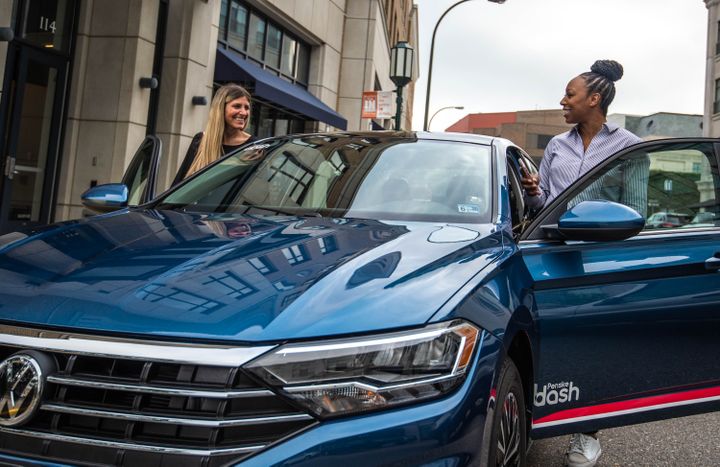What Is Penske Doing in Carsharing?
Penske Corporation — the trucking logistics, rental, and leasing giant, owner of commercial and retail dealership groups as well as 18 Indy 500 victories, that Penske — is getting into carsharing.
Penske Dash carsharing service launched last week in Washington, D.C. and Arlington, Va.
In the world of carsharing, the program is familiar: Penske Dash offers Volkswagen Jetta SE models for rent by the minute, hour, or day through the proprietary app. Pricing is dynamic. Current rental rates are listed at 45 cents per minute, $15 per hour, $40 for three hours, $70 for six hours, or $85 for a full day. Rates are inclusive of fuel, parking, and insurance. Members cannot exceed 200 miles per rental.
Members have 24/7 access to a call center and a local fleet operations team.
Penske Dash has partnered with Ridecell, which is powering the mobile app, payment processing, parking info, and predictive analytics for the fleet.
Local operations are led by Paul DeLong, who served as president and CEO of Car2Go North America and spent 12 years at Daimler Trucks of North America before that. Michael Montri, chief operating officer, served as the v.p. of fleet operations when Penske owned a Hertz car rental franchise in Memphis and Indiana.
Penske Dash begins service amidst a shakeup in the carsharing market: Car2Go recently announced plans to close in five major North American cities by the end of the year. Maven, GM’s shared mobility platform, shuttered in eight cities earlier this year.
What makes Penske think it can prevail where others have struggled?
One area is operational, according to Montri: “We can take advantage of infrastructure through our joint venture partners at Penske Corporation and Penske Truck Leasing, particularly on the service and roadside assistance portion of the carsharing business.”
Another is the customer experience: “Making sure we take care of the customer, listen to feedback, and exceed expectations is the classic Penske way of doing business,” Montri said. “We just want to make sure we get it right.”
As Penske considered starting a carsharing service, both D.C. and Arlington presented themselves as natural markets in which to launch. “Both municipalities have welcomed private companies to come in and provide their communities with alternate transportation and they’ve made entry very palatable,” Montri said.
Penske Dash is “free floating” in Arlington, meaning members can pick up and drop off the cars at any unrestricted public parking spot. In D.C., members access cars through Colonial Parking, which has garages and lots throughout the city.
While carsharing doesn’t need brick-and-mortar locations, servicing vehicles scattered throughout a geographic area requires another layer of labor. Doing this poorly manifests in vehicle cleanliness issues, which came up in Penske’s pre-market surveys.
While many carsharing platforms employ freelancers to maintain and rebalance the fleet, Penske decided to manage the process in house. “We think having our own people and using Penske’s processes will give us an advantage when it comes to control over the cleanliness of the cars,” said Montri.
The service will be marketed through online campaigns and through local connections, including its parking partnerships, and maybe “a food truck rally,” Montri said. However, the primary goal is organic growth through customer referral and repeat business.
“We’re not focusing on number of members or size of fleet, we just want to make sure we exceed customers’ expectations,” he said.
Penske is exploring new partnerships through its parking contract and with companies and universities to put cars on their campuses. However, just out of launch, Montri and his team are concentrating on refining the service before expanding.
Would Penske consider bringing its carsharing initiative to its core businesses in trucks? That’s a question for the Penske Corporation, Montri said. However, “The entire company will learn a lot from what we’re going to experience in this business.”
by Chris Brown
Source: https://www.fleetforward.com
FLEET MANAGEMENT AUDIT
Fleet management is the use of a set of vehicles in order to provide services to a third-party, or to perform a task for our organization, in the most efficient and productive manner with a determined level of service and cost.
Fleet management activities are shown in the following graph 1:

Graph 1: fleet management activities
The proposal audit analyses and assesses all fleet management activities shown in the graph 1, and its main goals are:
- Know the overall status of the fleet management activities
- Provide the analysis, the assessment, the advice, the suggestions and the actions to take in order to cut costs and increase the efficiency and efficacy of the fleet management activities
With the information obtained, we’ll elaborate a report that holds the overall status of the fleet management as well as the suggestions, recommendations and the measures to take in order to cut costs and optimize the fleet management activities.
CLICK ON THE FOLLOWING LINK TO DOWNLOAD THE PROPOSED FLEET MANAGEMENT AUDIT:
Fleet Management Audit AFMC
Contact:
José Miguel Fernández Gómez
34 678254874



